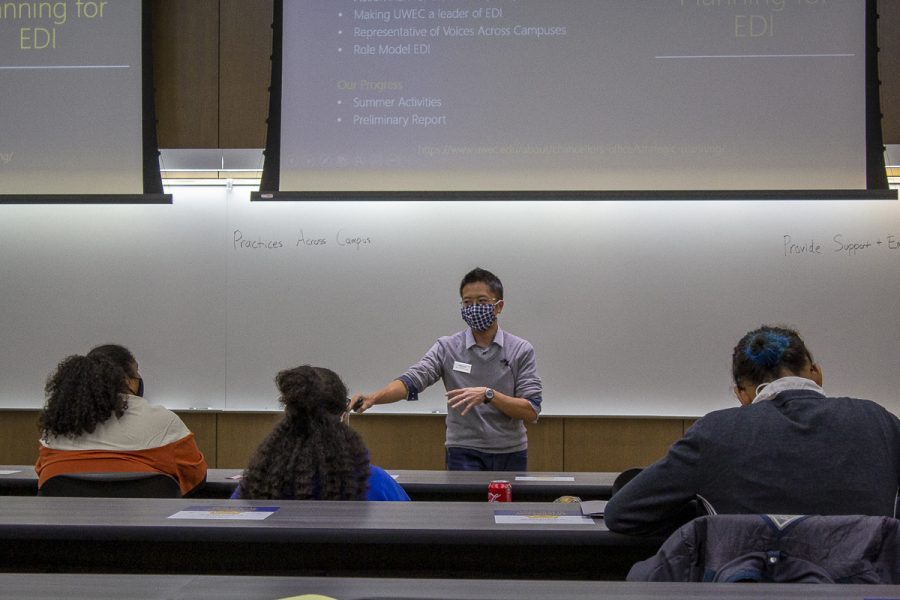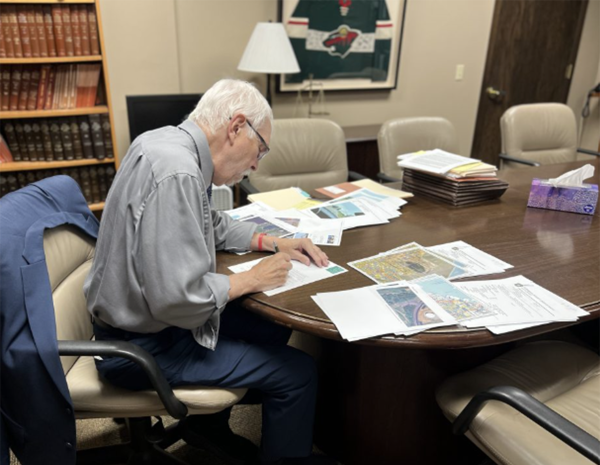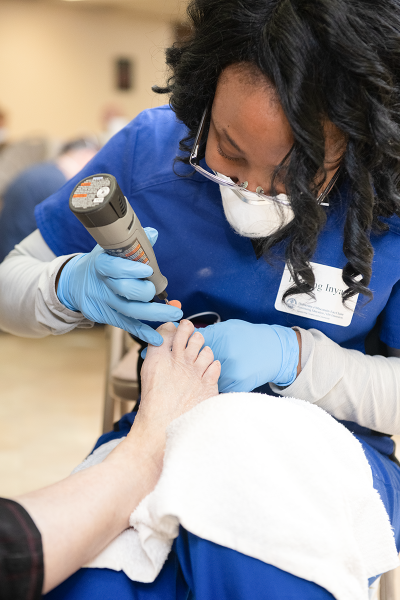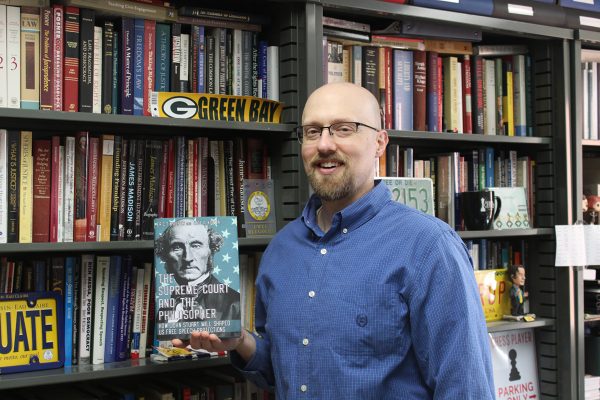One year later: UWEC leaders reflect on COVID-19’s impact
March 12 marks one year since UW-Eau Claire suspended in-person classes
More stories from Ta'Leah Van Sistine
Photo by Emma Steiler
UW-Eau Claire students, faculty and staff were notified before the Fall 2020 semester that masks would be required to wear on campus.
At the 17th annual Research in the Rotunda event on March 11, 2020, undergraduate students and faculty advisors from across the UW System were presenting their research in the Wisconsin State Capitol.
It was during that event when the UW-Madison campus community was notified in-person classes would be suspended.
Chancellor James C. Schmidt said there, when he was attending the Research in the Rotunda event, is where everything started — when COVID-19 began impacting UW-Eau Claire.
Now, a year later, the UW-Eau Claire community is reflecting on the challenges COVID-19 inflicted, the strengths revealed amid the pandemic and what instruction may look like moving forward.
March 11, 2020: Where it all began
Throughout the day, UW institutions followed in UW-Madison’s footsteps, but UW-Eau Claire was one of the last to suspend in-person classes.
“County Public Health was asking us not to cancel classes and not to send people home,” Schmidt said, regarding UW-Eau Claire’s decision to wait. “They were saying, ‘Your students are far safer on campus than sending them back into other communities.’ ”
On the afternoon of March 11 last year, an email from the UW-Eau Claire Chancellor’s Office said face-to-face classes and labs would still be held, but attendance policies would be suspended.
A day later, Schmidt emailed students explaining that a previously in-person “Information Forum” to answer students’ questions was going to be livestreamed instead.
“I am aware that some UW campuses have announced decisions regarding class schedules, travel and events in relation to spring break, “ Schmidt said in the email. “I will be meeting with the Emergency Response Team, the deans of our colleges and shared governance leaders immediately following the Information Forum to consider similar action.”
Close to 4 p.m. on March 12, 2020, Blugolds were notified there would be no in-person classes from March 14 through April 3 and they would resume online April 6.
Schmidt said meeting with the Emergency Response Team before suspending in-person classes was crucial because, to his knowledge, there were no confirmed COVID-19 classes in Eau Claire at the time, so he wanted to speak with senior and shared governance leaders.
“When the decision might seem obvious to me, you’re always going to get a better decision if you consult with other people,” Schmidt said. “It wasn’t a situation where we had an active shooter on campus — there you have to make decisions immediately.”
Blugolds studying abroad in the Schengen countries within Europe, excluding the United Kingdom and Ireland, were also notified on March 12 that their programs would be suspended.
Schmidt said students studying abroad couldn’t be forced to return to the U.S. because UW-Eau Claire isn’t a private institution, but Blugolds were informed if they chose to stay, their travel and health insurance would be voided.
“I think that all but maybe a couple chose to come back, which was the right decision,” Schmidt said.
Reflecting on an unprecedented year
While Kim Frodl, the medical director at Student Health Service, didn’t start in her position until September 2020, she said working in the family medicine department at Mayo Clinic in Eau Claire at this time last year allowed her to experience the uncertainty of the pandemic first-hand.
“What I remember about the spring is that we just didn’t know what was coming and so trying to be prepared for something that we couldn’t predict — it was a crazy time,” Frodl said.
Although the year has seemed long, Frodl said UW-Eau Claire can now shift efforts toward obtaining the COVID-19 vaccine and getting people vaccinated.
Frodl said it’s important people don’t let their guards down, however, because the COVID-19 vaccine isn’t currently an “end-all solution.”
She said she recognizes why students are becoming “fatigued” with COVID-19 safety precautions, but she said it’s “really reassuring” they are still following recommendations.
When UW-Eau Claire informed students in June 2020 that face coverings would be required to wear on campus, Chancellor Schmidt said he believed students would be compliant with the mandate.
“I knew if 80% of the students were embracing this, the other 20% would come along, frankly just because there’s peer pressure,” Schmidt said.
He said there may be Blugolds who don’t believe COVID-19 is a dangerous virus, but they ultimately believe in being a part of a community where standards should be followed.
“Do I believe every student has faithfully taken their temperature? No. Have I faithfully taken my temperature every single day? No,” Schmidt said. “But what it forces you to do, even if you’re not (taking your temperature), it makes you take a mental inventory of how you’re feeling.”
During this past year, UW-Eau Claire Student Body President Anna Ziebell said, like many students, she has missed face-to-face interactions with faculty, staff and peers.
“I think there’s a bit of a grieving process that everyone has gone through or is still going through about how things used to be,” Ziebell said.
As a soon-to-be graduating student, Ziebell said it’s been sad her final semesters on campus have been “plagued by the pandemic,” but she said she’s been impressed with the university’s ability to respond to necessary changes over the course of the year.
Ziebell served on several committees over the summer as interim student body president to assist with the planning process for the upcoming fall semester.
She said she met with university administration at least once a month to discuss the creation of an isolation space on campus and how Blugold dining would work, among other elements.
“As crazy as it was this summer, we were steps ahead of other universities in terms of planning,” Ziebell said.
Looking to the Fall 2021 semester
In reflecting on the university’s response to the COVID-19 pandemic, Chancellor Schmidt said this past year “wasn’t perfect.”
Schmidt said online or hybrid courses did not work well for some students and at the Fall 2020 mid-term point, there were “a record number of As and record number of Fs.”
However, Schmidt said UW-Eau Claire faculty, staff and students made this academic year possible.
On Tuesday, Schmidt sent an email to students with updates about what to expect for the upcoming Fall 2021 semester, including the following:
- “A return to in-person classroom and lab instruction at regular capacity. About 85% of our classes will again be offered in person
- Music, theater and athletic activities open to fans and supporters
- Residence hall living as before with programs and recreational activities that bring students together
- Dining selections as they were before the pandemic with increased seating at all our dining facilities
- Forums, events and student organizations active across campus”
Schmidt said it was more of “a practical decision” to tell the campus community that they could expect a more traditional fall semester because plans needed to be made about how courses would be listed in the registration system.
Referencing President Joe Biden’s plan to have all Americans eligible for the COVID-19 vaccine by May 1, Schmidt said a more traditional fall semester seems possible.
“If that’s the plan, we should be able to have a fully engaged school year,” Schmidt said.
UW-Eau Claire will continue to follow the advice of experts and observe COVID-19 protocols in other countries, but Schmidt said prospects for study abroad and the National Student Exchange programs in the fall look hopeful as well.
Schmidt said a decision regarding fall study abroad programs will take place no later than June.
Although there is hopeful news for the fall semester, Schmidt said it’s important students continue to follow COVID-19 protocol.
“I’m starting to see pictures of big outside gatherings,” Schmidt said. “Things are going to be engaging in September, but it’s still March.”
Schmidt said he is not aware of any faculty, staff or students who have died from COVID-19, so he wants students to remain vigilant.
“We’re very fortunate,” Schmidt said. “I would hate to say that some vulnerable person caught this because we weren’t paying attention.”
Van Sistine can be reached at [email protected].











Janice Hoffmann • Mar 13, 2021 at 10:06 am
I enjoyed this article, it was very informative and gave a glimpse of the feelings of the students.
I respect the procedures used at UW Eau Claire
to put a priority on student safety and at the same time keep their education a priority also.
A very well written article.